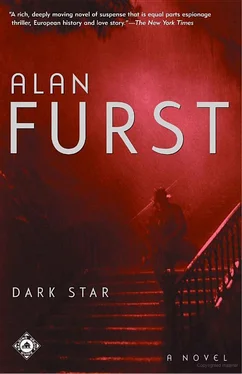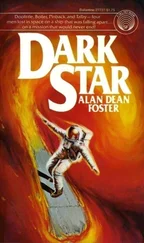Alan Furst - Dark Star
Здесь есть возможность читать онлайн «Alan Furst - Dark Star» весь текст электронной книги совершенно бесплатно (целиком полную версию без сокращений). В некоторых случаях можно слушать аудио, скачать через торрент в формате fb2 и присутствует краткое содержание. Жанр: Шпионский детектив, на английском языке. Описание произведения, (предисловие) а так же отзывы посетителей доступны на портале библиотеки ЛибКат.
- Название:Dark Star
- Автор:
- Жанр:
- Год:неизвестен
- ISBN:нет данных
- Рейтинг книги:3 / 5. Голосов: 1
-
Избранное:Добавить в избранное
- Отзывы:
-
Ваша оценка:
- 60
- 1
- 2
- 3
- 4
- 5
Dark Star: краткое содержание, описание и аннотация
Предлагаем к чтению аннотацию, описание, краткое содержание или предисловие (зависит от того, что написал сам автор книги «Dark Star»). Если вы не нашли необходимую информацию о книге — напишите в комментариях, мы постараемся отыскать её.
Dark Star — читать онлайн бесплатно полную книгу (весь текст) целиком
Ниже представлен текст книги, разбитый по страницам. Система сохранения места последней прочитанной страницы, позволяет с удобством читать онлайн бесплатно книгу «Dark Star», без необходимости каждый раз заново искать на чём Вы остановились. Поставьте закладку, и сможете в любой момент перейти на страницу, на которой закончили чтение.
Интервал:
Закладка:
Alan Furst
Dark Star
“You may not be interested in war,
but war is interested in you.”
— Lev Bronshtein, known as Leon Trotsky June 1919Silence in Prague
In the late autumn of 1937, in the steady beat of North Sea rain that comes with dawn in that season, the tramp freighter Nicaea stood at anchor off the Belgian city of Ostend. In the distance, a berthing tug made slow progress through the harbor swell, the rhythm of its engine distinct over the water, its amber running lights twin blurs in the darkness.
The Nicaea, 6,320 gross tonnes, of Maltese registry, had spent her first thirty years as a coastal steamer in the eastern Mediterranean, hauling every imaginable cargo from Latakia to Famagusta, back to Iskenderun, down to Beirut, north to Smyrna, then south to Sidon and Jaffa-thirty years of blistering summers and drizzling winters, trading and smuggling in equal proportion, occasionally enriching, more typically ruining, a succession of owner syndicates as she herself was slowly ruined by salt, rust, and a long line of engineers whose enthusiasm far exceeded their skill. Now, in her final years, she was chartered to Exportkhleb, the Soviet Union’s grain-trading bureau, and she creaked and groaned sorrowfully to lie at anchor in such cold, northern seas.
Riding low in the water, she bore her cargo gracelessly- principally Anatolian wheat bound for the Black Sea port of Odessa, a city that had not seen imported grains for more than a century. She carried, as well, several small consignments: flaxseed loaded in Istanbul, dried figs from Limassol, a steel drum of Ammonal-a mining explosive made of TNT and powdered aluminum-en route to a sabotage cell in Hamburg, a metal trunk of engineering blueprints for an Italian submarine torpedo, deftly copied at a naval research station in Brindisi, and two passengers: a senior Comintern official using a Dutch passport with the alias Van Doorn, and a foreign correspondent of the newspaper Pravda traveling under his true name, Andre Szara.
Szara, hands thrust deep in pockets, hair blown about by the offshore gale, stood in the shelter of a passageway and silently cursed the Belgian tug captain who, from the methodical chug of the engine, was taking his own sweet time attending to the Nicaea. Szara knew harbormen in this part of the world; stolid, reflective pipe smokers who were never far from the coffeepot and the evening paper. Unshakable in crisis, they spent the rest of their days making the world wait on their pleasure. Szara shifted his weight with the roll of the ship, turned his back to the wind, and lit a cigarette.
He had boarded the freighter nineteen days earlier, in Piraeus, having been assigned a story on the struggle of the Belgian dockworkers. That was one assignment; there was another. Killing time in a dockside tavern as the Nicaea was eased into moorage, he had been approached by the World’s Plainest Man. Where, he wondered, did they find them? Russia marked people: deformed most, made some exquisite, at the very least burned itself deep into the eyes. But not this one. His mother was water, his father a wall. “A small favor,” said the world’s plainest man. “You’ll have a fellow passenger, he is traveling on Comintern business. Perhaps you will find out where he is stopping in Ostend.”
“If I can,” Szara had said. The word if could not really be used between them, but Szara pretended it could be and the NKVD operative-or GRU or whatever he was-graciously conceded his right to suggest he had a choice in the matter. Szara, after all, was an important correspondent.
“Yes. If you can,” he’d said. Then added, “Leave us a little note at the desk of your hotel. To Monsieur Brun.”
Szara spelled it, to make sure he’d got it right. Defiance was over for the day.
“Just so,” said the man.
There was ample time to do the small favor; the Nicaea had been at sea for nineteen days, an eternity of icy, seawater showers, salt cod for dinner, and the smell of coal fumes from the freighter’s rusting stack as she butted through the October seas. Squinting through the darkness at the lights of the wallowing tug, Szara ached for something sweet, sugar after salt, a cream cake, rain in a pine forest, a woman’s perfume. He had, he thought, been too long at sea. An ironist, he heard the theatrical echo of the phrase and grinned privately. La melancolie des paquebots -that said it better. He’d come across the phrase in Flaubert and it had stayed with him; it was all in those four words, the narrow cabin with a light bulb swaying on a cord, the seaweed reek of harbors, slanting rains, a column of black smoke from a funnel on the horizon.
The ship’s bell sounded once. Four-thirty. The tug’s amber lights grew brighter.
The Comintern man known as Van Doorn stepped from his cabin carrying a leather valise and joined Szara at the railing. He was swaddled in clothing like a child dressed for a winter day, woolen muffler crossed precisely at his throat, cap set low on his head, overcoat buttoned to the very top. “One hour, eh? And we’ll be down the gangplank. What is your view, Andre Aronovich? ” Van Doorn was, as always, wryly deferential toward “the famous journalist Szara.”
“If the port officer makes no difficulties, I would agree,” Szara said.
“That will not happen. He is nasch.” The word meant ours, we own him, and the tone suggested Szara’s great fortune in having such iron-fisted types as Van Doorn to watch out for him “in the real world.”
“Well, then …” Szara said, acknowledging superior strength.
It happened that Szara knew who Van Doorn was; one of his friends in the Foreign Department of the NKVD had once pointed him out, with a sneer, at a party in Moscow. Szara’s NKVD friends were, like himself, Russified Polish Jews or Latvians, Ukrainians, Germans, all sorts, and typically intellectuals. They constituted his khvost -the word fell somewhere between clique and gang. Van Doorn, in fact Grigory Khelidze, was from a different crowd: Georgians, Armenians, Russified Greeks and Turks, a khvost with roots in the southeast corner of the empire led by Beria, Dekanozov, and Alexei Agayan. It was a smaller group than the Poles and Ukrainians but easily its equal in power. Stalin came from down there; they knew what he liked and how he thought.
From the tugboat’s silhouette, a high shape against the rain-softened glow of the city, a blinkered signal light began to operate. This was progress. Khelidze rubbed his hands to warm them up. “Not long now,” he said merrily. He gave Szara a lecher’s grin; in no time at all he’d be with his “perfect dumpling.”
Thank heaven for the dumpling, Szara thought. Without her he might never have managed the small favor. Khelidze wasn’t much to look at, a fattish man in his forties with pale hair worn well brushed and pomaded. His hands were small and chubby, endlessly fussing with a pair of silver-rimmed spectacles of which he was very proud. But he fancied himself a ladies’ man. “I envy you, Andre Aronovich,” he’d said one night when they were alone in the ship’s wardroom after dinner. “You move in exalted circles. The way it is with my job, well, the best I can hope for is the frau of some German shop steward, a big Inga with red hands, and then, likely as not, all a man gets is an extra potato and a stolen cuddle in the kitchen. Ah, but a man in your position-for you it’s professors’ daughters and lawyers’ wives; those hot, skinny bitches that can’t leave a journalist alone. Isn’t it so?”
Szara had brought vodka to the feast, also brandy. The vast, green ocean rolled beneath them, the Nicaea’s engines coughed and grumbled. Khelidze rested his elbows on the faded oilcloth and leaned forward in expectation, a man who wanted to hear every detail.
Читать дальшеИнтервал:
Закладка:
Похожие книги на «Dark Star»
Представляем Вашему вниманию похожие книги на «Dark Star» списком для выбора. Мы отобрали схожую по названию и смыслу литературу в надежде предоставить читателям больше вариантов отыскать новые, интересные, ещё непрочитанные произведения.
Обсуждение, отзывы о книге «Dark Star» и просто собственные мнения читателей. Оставьте ваши комментарии, напишите, что Вы думаете о произведении, его смысле или главных героях. Укажите что конкретно понравилось, а что нет, и почему Вы так считаете.












